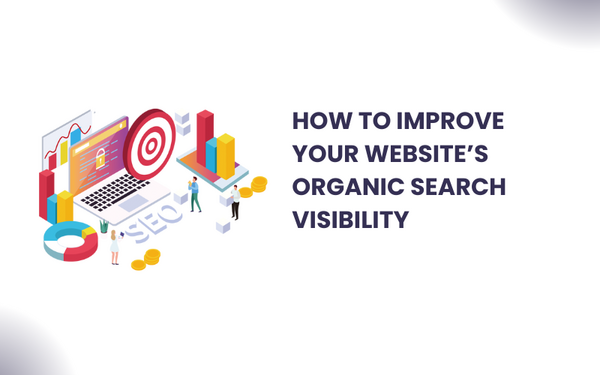Improving your website’s organic search visibility is crucial for attracting more visitors without relying on paid advertisements. Organic search visibility refers to how well your website appears in search engine results pages (SERPs) when users search for related keywords. When your website ranks higher for relevant queries, more users are likely to click on your link, leading to increased traffic, higher engagement, and potentially more conversions.
There are many strategies to enhance your website’s organic search visibility. These strategies focus on improving your website's relevance, authority, and user experience. By implementing best practices in search engine optimization (SEO), you can ensure that your website is visible to your target audience. Let’s explore these strategies in detail.
Understanding Organic Search Visibility
What is Organic Search?
Organic search refers to the unpaid listings that appear on search engine results pages. These results are determined by the search engine’s algorithm, which evaluates websites based on several factors like relevance to the search query, content quality, authority, and user experience. The higher a website ranks organically, the more visible it becomes to users.
Importance of Organic Search Visibility
Having strong organic search visibility means that your website will attract more traffic without needing to invest heavily in paid ads. This type of visibility builds long-term value because once your website starts ranking well, it tends to stay there with consistent effort. Organic visibility is often seen as more trustworthy and credible by users compared to paid advertisements, which are marked as sponsored.
Search Engine Algorithms
Search engines like Google use complex algorithms to determine which websites should rank higher for particular search terms. These algorithms are designed to provide users with the most relevant and useful information based on their search queries. While the exact formulas are closely guarded secrets, there are several known factors that affect rankings, such as keywords, backlinks, user behavior, and content quality.
Understanding these factors allows you to tailor your website’s content and structure to improve its visibility. Let’s delve into these factors and how to optimize them.
Keyword Research and Optimization
What are Keywords?
Keywords are the terms and phrases users type into search engines when looking for information. For example, if someone wants to learn how to improve their website’s organic search visibility, they might type in “SEO tips,” “improve website ranking,” or “organic search strategies.”
Conducting Keyword Research
Effective keyword research is the foundation of improving organic search visibility. To start, use tools like Google Keyword Planner, Ubersuggest, or SEMrush to identify keywords that are relevant to your business and have high search volume but low competition.
Choosing the Right Keywords
When selecting keywords, consider factors like search volume, competition, and relevance to your audience. It’s essential to choose a mix of high-traffic keywords and long-tail keywords (specific phrases with lower search volume but higher intent).
Optimizing Content for Keywords
Once you’ve selected the appropriate keywords, incorporate them naturally into your website’s content. This includes titles, headers, meta descriptions, and the body of your pages. Be cautious not to overuse keywords (a practice known as keyword stuffing) as this can harm your rankings. Instead, focus on providing valuable, informative content that satisfies the user’s search intent.
Creating High-Quality Content
Why Content Matters for Organic Visibility
Content is one of the most critical factors for search engine optimization. High-quality, relevant content helps your website rank higher in search results because it demonstrates to search engines that your site is a valuable resource for users. Additionally, engaging content keeps users on your site longer, reducing bounce rates and signaling to search engines that your site offers a good user experience.
Types of Content to Improve Visibility
Various types of content can help boost organic search visibility, including blog posts, articles, guides, videos, infographics, and more. Diversifying your content ensures that you’re reaching different segments of your audience and catering to their preferences.
Structuring Content for SEO
To optimize your content for search engines, ensure it’s well-structured. Use headings (H1, H2, H3, etc.) to break up the text and make it easier to read. Additionally, include images and videos to enhance engagement and use internal links to connect your content to other relevant pages on your site.
Content Length and Depth
Longer, more in-depth content tends to rank better because it covers topics comprehensively and provides more value to readers. Aim to create content that thoroughly addresses user queries and provides actionable insights.
Regular Content Updates
Search engines prefer websites that are regularly updated with fresh, relevant content. Adding new blog posts, updating old content, and refining your existing pages can help improve organic visibility. An active website signals to search engines that you’re maintaining and improving your site, which can boost rankings.
Improving Website Structure and Navigation
Why Structure is Important
A well-organized website helps search engines crawl and index your pages more effectively, leading to better rankings. If your site is easy to navigate, it also improves the user experience, which can result in longer session durations and lower bounce rates.
Creating a Clear Site Hierarchy
Your website should have a clear and logical hierarchy, with primary pages linked to secondary ones. The structure should guide users through your site easily, allowing them to find the information they need without confusion. Use a combination of internal links and clear categories to help organize your content.
URL Structure
Search engines prefer clean, descriptive URLs that make it easy to understand what the page is about. For example, a URL like "www.yoursite.com/organic-search-tips" is much more effective than something like "www.yoursite.com/page123." Keeping URLs short and keyword-rich can contribute to better search engine rankings.
Optimizing Meta Tags and Descriptions
What Are Meta Tags?
Meta tags provide search engines with information about your website's content. These tags are part of your site's HTML code and include elements like title tags, meta descriptions, and alt text for images.
Optimizing Title Tags
Your title tag is the most important on-page SEO element. It should include your target keyword and be descriptive enough to tell users what the page is about. A compelling, keyword-rich title can significantly improve click-through rates (CTR).
Meta Descriptions
The meta description appears under the title in the search results and provides a brief summary of the page. While meta descriptions don’t directly affect rankings, they play a crucial role in influencing user clicks. Write clear, concise, and engaging descriptions that encourage users to visit your site.
Building Backlinks for Authority
What Are Backlinks?
Backlinks are links from other websites that point to your site. Search engines view backlinks as a vote of confidence in your content. If reputable sites link to yours, it signals that your site is a trusted source of information, which can improve your organic search visibility.
Strategies for Earning Backlinks
There are several strategies you can use to earn backlinks. Some of these include:
- Guest Blogging: Writing articles for other websites in exchange for a backlink to your site.
- Creating Link-Worthy Content: Producing high-quality, informative content that others will want to reference.
- Outreach: Reaching out to other website owners or influencers in your industry and asking them to link to your content.
Quality Over Quantity
Not all backlinks are created equal. Focus on earning high-quality backlinks from reputable websites rather than trying to accumulate a large number of low-quality links. Search engines pay attention to the authority of the sites linking to you, so prioritize quality over quantity.
Improving Mobile Friendliness
The Importance of Mobile Optimization
With more users accessing the internet via mobile devices, search engines now prioritize mobile-friendly websites. In fact, Google uses mobile-first indexing, meaning it primarily looks at the mobile version of your site when determining rankings.
Ensuring Responsive Design
To improve your site’s mobile friendliness, ensure that it has a responsive design that automatically adjusts to fit different screen sizes. A mobile-friendly website enhances user experience and can improve your rankings in search results.
Optimizing Load Speed
Mobile users expect fast load times, and if your site takes too long to load, users may leave before it even finishes. Search engines also use site speed as a ranking factor, so optimize your images, minimize code, and use browser caching to improve load times.
Enhancing User Experience (UX)
Why UX Matters for SEO
User experience (UX) plays a significant role in organic search visibility. Search engines like Google want to provide users with the best possible experience, so they factor in UX when ranking websites. This includes things like site navigation, content accessibility, and mobile usability.
Reducing Bounce Rates
Bounce rate refers to the percentage of visitors who leave your site after viewing just one page. A high bounce rate can hurt your rankings because it suggests that users didn’t find what they were looking for. To reduce bounce rates, ensure that your content is relevant, engaging, and easy to navigate.
Improving Dwell Time
Dwell time refers to the amount of time a user spends on your site after clicking through from the search results. Longer dwell times indicate to search engines that users find your content valuable, which can boost your rankings. You can improve dwell time by creating engaging, informative content and using internal links to encourage users to explore more of your site.
Conclusion
Improving your website’s organic search visibility requires a combination of strategic SEO practices. From conducting thorough keyword research to building high-quality backlinks and optimizing user experience, each element plays a critical role in how well your website performs in search results. By continually refining your approach and staying updated with the latest SEO trends, you can improve your site's rankings and attract more traffic over time.
Remember, working with an Organic SEO specialist can provide you with expert insights and help you develop a comprehensive strategy tailored to your unique needs. With dedication and effort, you can achieve long-lasting results and maintain a strong online presence.



